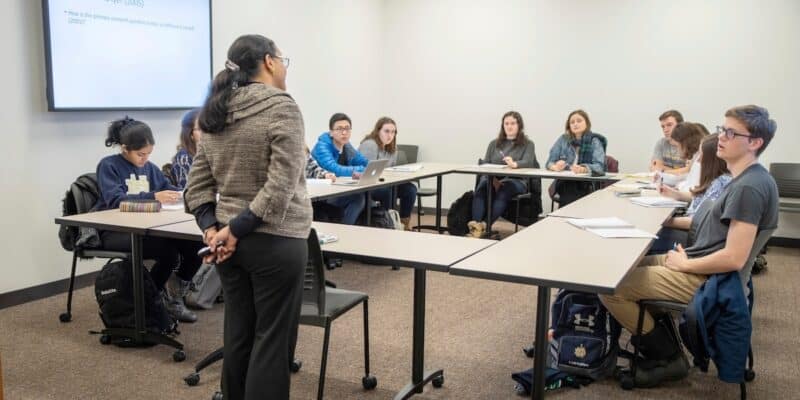Developing Your Teaching Persona: A Sociological Approach

As a sociologist, I often combine my pedagogical approach with what I learn from sociological theory. Recently, I revisited Erving Goffman’s The Presentation of Self in Everyday Life and couldn’t help but think about how his work speaks to the experiences of teachers. Utilizing the framework of performance, Goffman shows how people manage impressions to create a self-image, almost like an actor on stage. Teaching, to me, feels like a performance of sorts. Goffman’s work reminded me of a moment early on in my career when I was asked by a mentor, “What’s your teaching persona?” It led me to question who I was as a teacher and what image I wanted to project. I encourage all educators to think about what their teaching persona is and offer a few insights below gathered from Goffman’s text.
All The World’s a Stage
Teaching is a performance in that you must keep students’ attention, find effective strategies to aid learning, and present material in an engaging way. You’re center stage, and all eyes are on you. Be yourself (or a professional version of yourself). Wear clothes that make you feel great, crack jokes occasionally, and share appropriate parts of your life with your students. There is a balance of professionalism and authenticity that requires intentionality. For example, take time to reflect on what you feel comfortable students knowing about your life. Goffman also writes about the “setting.” Arrange the classroom in a way that fosters the atmosphere you want, such as a circle if it’s a discussion section or ample space for small groups to work together. Also, decorate your office in a welcoming way. Whether you hang your diploma on your wall or a picture of your kids, your office space says a lot about you. Develop a persona that feels authentic to you.
Backstage
Goffman talks about backstage of the performance: “Here the performer can relax: he can drop his front, forgo speaking his lines, and step out of character.” (112) As important as it is to have your persona developed, you also need spaces to be your truest self with friends and family. While the backstage is a place the persona need not be, it’s also important to use backstage as a space of preparation. Use this liminal space to make sure the performance runs smoothly. Have your mini-lectures ready, set time limits for each activity, ensure technology will work as planned, and arrive early to greet students. No performance or class will work without proper preparation.
Colleagues
Goffman points to the importance of colleagues, those engaged in a similar performance but not participating together, as another community where the persona can cease. “The front that is maintained before others need not be maintained among themselves.” (160) Your colleagues are essential in developing your persona. Find a mentor whose teaching persona you respect, and try to incorporate their style into your own. Connect with other faculty or graduate students where you can bond over shared experiences and struggles. Additionally, the Kaneb Center can help you develop as a teacher through classroom observations, teaching workshops, and a lending library.
Discipline
Goffman talks about the necessity of discipline in performance. The greats did not make it without grit—the Olympic swimmer did not achieve their status without hours upon hours submerged in chlorine, the master violinist would not be first chair without calloused fingers, the actor never would make it to Broadway without overcoming stage fright. Practice, make mistakes, but never lose sight of your end goal.
Your teaching persona is not a mask, it is an extension of who you are. Start now in thinking about how you want to present yourself to students, and know your teaching persona will continue to evolve over time and change with each class.
Eli Williams is a graduate associate at Notre Dame Learning’s Kaneb Center for Teaching Excellence and a Ph.D. candidate in the Department of Sociology at Notre Dame.